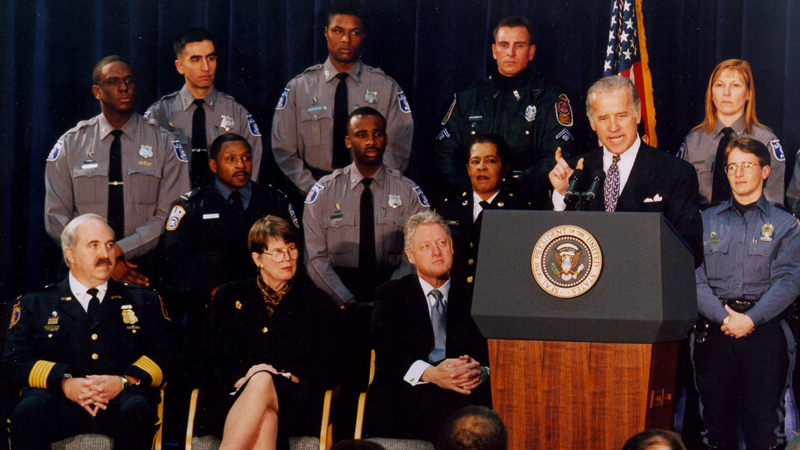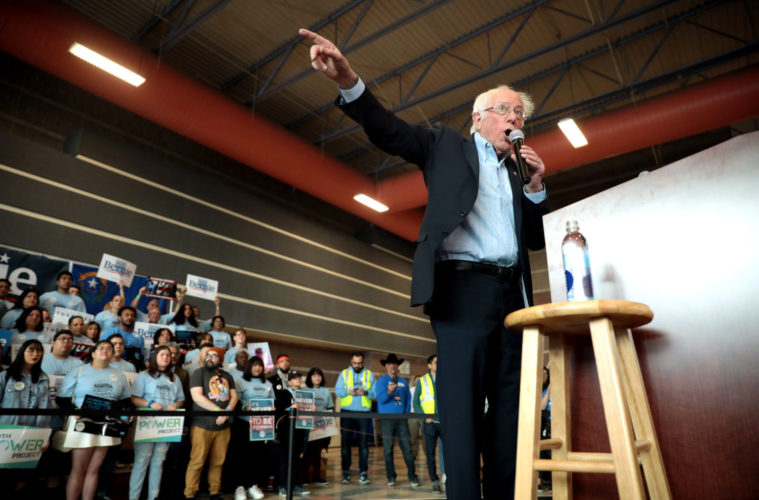In every election cycle since Proposition 215 first passed in 1996, cannabis has only risen in profile to become a mainstream issue leading to this year’s presidential primary, where it continues to be a hot topic among the field of old drug warriors, progressives and whatever Michael Bloomberg is.
The latest numbers from NPR and PBS have Bernie Sanders leading the pack at 31 percent. Jumping into second place for the first time is former New York City Mayor Michael Bloomberg at 19 percent, showing the power of a $400 million dollar ad buy. Joe Biden and Elizabeth Warren are on Bloomberg’s heels at 15 percent and 12 percent, respectively. Mayor Pete Buttigieg is at 10 percent.
Across the field is the dynamic tale of cannabis over the decades. We’ll take a look at where the Democratic presidential stand today on pot, and if they are aligned with the latest annual Pew Research Center numbers that say 67 percent of Americans are in favor of legalizing marijuana.
Bernie Sanders
Among the pack, there is no doubt that Bernie Sanders is definitely the biggest ally of marijuana left on the ticket. (Corey Booker certainly had an argument at the spot during his effort.) Sanders has made legalizing marijuana a key part of his criminal justice platform for 2020 alongside other causes like banning for-profit prisons and ending cash bail. While his platform maintains Bernie would legalize pot in the first one hundred days, more recently he has said he would do it on his first day in office.
Among all contenders left Sanders has the longest track record of supporting cannabis reform. He first called for decriminalization as the mayor of Burlington, Vermont, in the 1980s. His advocacy continued to both chambers of Congress, throughout the last two decades and on the campaign trail today.
Michael Bloomberg
Former New York City Mayor/billionaire Michael Bloomberg has a uniquely checkered history with marijuana. This week his campaign announced Bloomberg’s criminal justice platform noting, “Mike’s plan will decriminalize possession and use of marijuana nationwide, commute any existing sentences and expunge any records.”
In December, the Wall Street Journal called Bloomberg’s cannabis views out of step with the rest of the Democratic field. Couple this with a recording that surfaced a few weeks ago of him defending New York City’s controversial Stop and Frisk program; it did not sound like someone who learned a lot from the firestorm that happened once data showed the impact the policy had on young men of color.

(Senate.gov/Wikicommons)
Joe Biden
Joe Biden has been caught applauding the idea of things like the gateway theory in the past, one of the most debunked talking points in the arsenal of those who hope to stop the wave of pot policy reform from coast to coast.
But according to his criminal justice platform, Biden doesn’t think anyone should be in jail for marijuana. He would decriminalize cannabis use and automatically expunge prior convictions. He also claims he would leave decisions about recreational use up to the states, and recategorize cannabis as a Schedule II drug so researchers can study its positive and negative impacts.
Many would say this is quite a bit of progress for one of the main architects on the left of mandatory minimum sentencing. But as has been echoed on the debate stage, Biden was the prototypical drug war Democrat when it came time to kick enforcement up a notch, and he took it to the next level with his 1994 crime bill.
Elizabeth Warren
While she was a little quiet at the beginning of the decade when asked to weigh in on the effort in Massachusetts to legalize cannabis, Elizabeth Warren has certainly come around in recent years as a sponsor for various progressive cannabis bills. Her efforts included introducing the states act in 2019 that would bar the Department of Justice from interfering in state-legal
When Warren pitched her plan for tribal nations across the U.S., she included speaking of their place in the marijuana industry moving forward. “While not every tribe is interested in the economic opportunities associated with changing laws around marijuana, a number of Tribal Nations view cannabis as an important opportunity for economic development,” Warren wrote in her plan, “I support full marijuana legalization, and have also introduced and worked on a bipartisan basis to advance the STATES Act, a proposal that would at a minimum safeguard the ability of states, territories, and Tribal Nations, to make their own marijuana policies.”
Pete Buttigieg
Of the field, Buttigieg has one of the more unique relationships with marijuana of the pack. When put on the spot about whether he would legalize medical and recreational marijuana by the Des Moines Register, Mayor Pete quickly replied that he would. He said the way we as a society handle nonviolent drug offenses like marijuana possession is costing us more than it’s benefiting us. The back and forth is the first thing that comes up in the criminal justice reform section of Buttigieg’s website.
But as The Intercept reported, Buttigieg’s relationship with cannabis enforcement during his time as the mayor of South Bend, Indiana, isn’t necessarily a pretty story. African Americans in the city were far more likely to find themselves in handcuffs over a cannabis offense at rates a lot worse than the rest of Indiana or the country.
Amy Klobuchar
Not one for national legalization or decriminalization efforts, Klobuchar has backed efforts in the Senate that would support more of a state’s rights approach.
Prior to her time in the Senate, NORML has given Klobuchar a D rating on their congressional scorecard. But since she has come around to at least wanting to give states the opportunity to choose their own path on marijuana, the score has bumped up to a B.
The Industry’s Expectations
With this being the biggest Super Tuesday ever for pot, we reached out to the National Cannabis Industry Association to get their take on being a marquee issue this election cycle with the lights shining brighter than ever on the subject.
“I hope that cannabis policy gets an even bigger moment in the spotlight on Super Tuesday,” NCIA media relations director Morgan Fox told L.A. Weekly. “Prohibition is a disastrous policy that roughly two-thirds of voters agree needs to end, and it should be center stage as we get closer to the elections.”
Fox believes it’s up to the candidates to show they stand with American voters on the issue.
“The American people deserve to know exactly where the candidates, as well current elected officials, stand on this unifying issue and what sort of policy directives we can expect from them,” Fox said, “We are past talking about whether cannabis should be legal; we need to hear how leaders are specifically going to go about regulating this substance and repairing the damage done over the last century, more than slogans and bandwagoning.”
Advertising disclosure: We may receive compensation for some of the links in our stories. Thank you for supporting LA Weekly and our advertisers.

